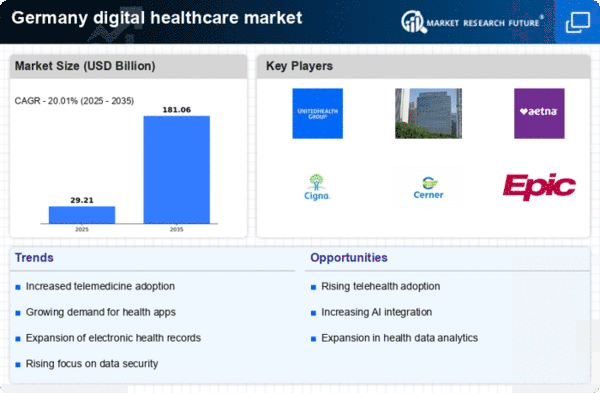Growing Focus on Patient-Centric Care
The digital healthcare market in Germany is increasingly oriented towards patient-centric care models. This shift is characterized by a greater emphasis on patient engagement, personalized treatment plans, and improved access to health information. Healthcare providers are leveraging digital tools to enhance communication with patients, allowing for more informed decision-making. Surveys indicate that over 70% of patients prefer digital interactions for managing their health, which underscores the importance of integrating digital solutions into care delivery. As the market evolves, the focus on patient-centric approaches is expected to drive further adoption of digital healthcare technologies, ultimately leading to better health outcomes and patient satisfaction.
Integration of Artificial Intelligence
The integration of artificial intelligence (AI) into the digital healthcare market in Germany is transforming how healthcare services are delivered. AI technologies are being utilized for predictive analytics, personalized medicine, and operational efficiencies. For instance, AI algorithms can analyze vast amounts of patient data to identify trends and predict health outcomes, which can lead to more tailored treatment plans. The market for AI in healthcare is anticipated to reach €2 billion by 2027, reflecting a growing recognition of its potential. As healthcare providers increasingly adopt AI-driven solutions, the digital healthcare market is likely to expand, enhancing the quality of care and operational efficiencies.
Regulatory Support for Digital Solutions
The digital healthcare market in Germany benefits from robust regulatory frameworks that encourage the adoption of digital health solutions. The German government has implemented policies such as the Digital Healthcare Act, which promotes telemedicine and digital health applications. This regulatory support is crucial as it provides a clear pathway for healthcare providers to integrate digital solutions into their practices. Furthermore, the market is projected to grow at a CAGR of approximately 20% from 2025 to 2030, driven by these favorable regulations. As healthcare providers increasingly adopt digital tools, the market is likely to see enhanced patient engagement and improved health outcomes, thereby solidifying the role of digital solutions in the healthcare ecosystem.
Rising Demand for Remote Patient Monitoring
The digital healthcare market in Germany is experiencing a surge in demand for remote patient monitoring solutions. This trend is largely driven by an aging population and the increasing prevalence of chronic diseases. According to recent statistics, around 30% of the German population is over 60 years old, creating a significant need for effective monitoring solutions. Remote monitoring technologies enable healthcare providers to track patients' health metrics in real-time, facilitating timely interventions and reducing hospital visits. This shift towards proactive healthcare management is expected to contribute to a market growth rate of around 15% annually, as more patients and providers recognize the benefits of these digital tools.
Increased Investment in Health Tech Startups
The digital healthcare market in Germany is witnessing a notable increase in investment directed towards health tech startups. Venture capital funding in this sector has surged, with investments reaching approximately €1 billion in 2025 alone. This influx of capital is fostering innovation and the development of new digital health solutions, ranging from telehealth platforms to health management applications. As startups introduce novel technologies, they are likely to disrupt traditional healthcare models, making services more accessible and efficient. This trend not only stimulates market growth but also encourages collaboration between established healthcare providers and emerging tech companies, further enriching the digital healthcare landscape.
















